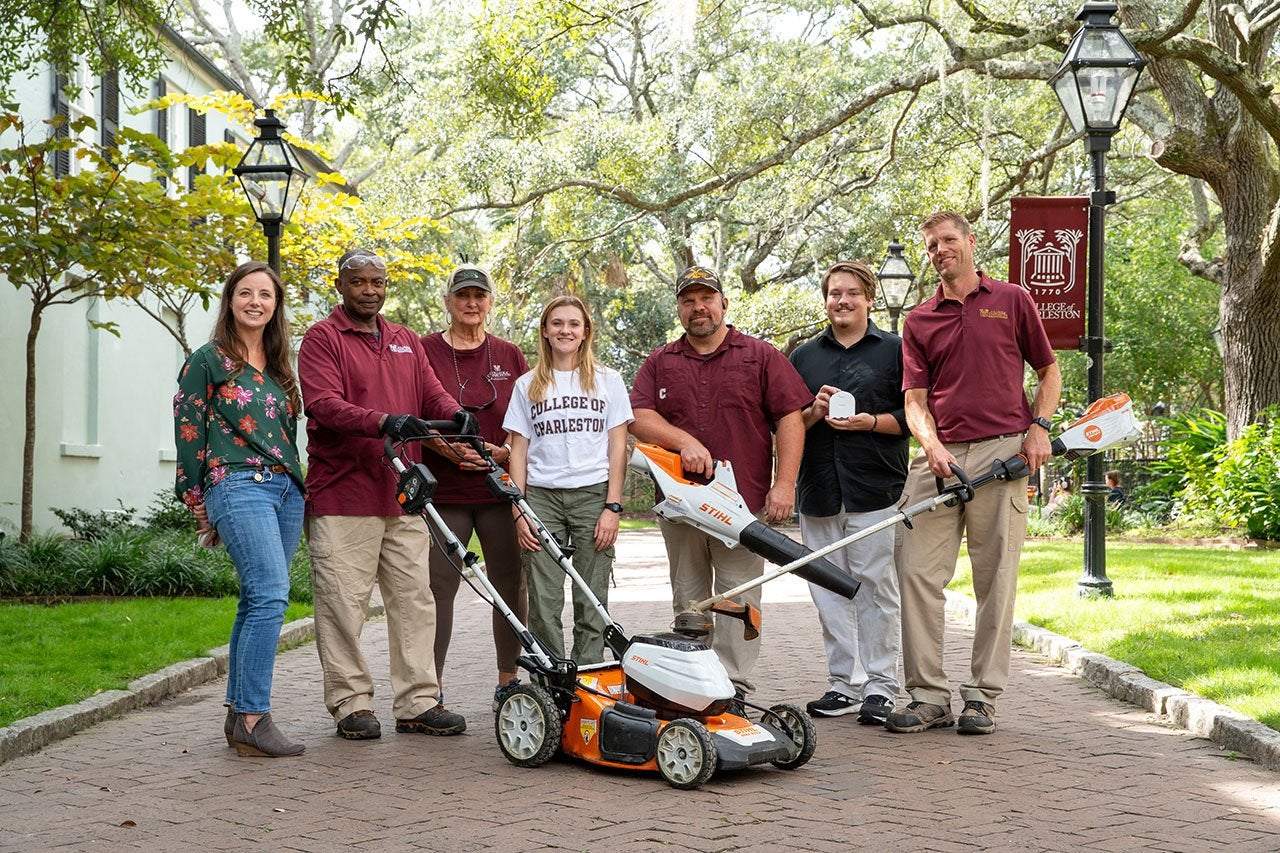Above (l–r): Kate Mullaugh, Sam Frazier (Grounds), Becca Hodges (Grounds), Zaria Killingsworth, Jay Peterson (Grounds), Anthony Rovinski, Verneil Phillips (Photo by Catie Cleveland)
Anyone walking around the College of Charleston campus has seen and heard the Grounds Crew hard at work maintaining and enhancing the beauty of our campus. While the drone of the equipment can be loud, it’s the emissions, which are toxic for humans and the environment, that caused Zaria Killingsworth, a chemistry major and medical humanities minor, and Anthony Rovinski, a chemistry major and Spanish minor, to take action.
“We had recently learned about particulate matter and some of its sources, one of them being the combustion of fossil fuels,” says Rovinski, referencing his environmental chemistry class with Kate Mullaugh, associate professor of chemistry and biochemistry. “Particulate matter can have adverse effects on a person’s health, depending on the concentration of the particles and their sizes. Since a large part of the grounds equipment was gas-powered and the groundskeeper would be in close proximity to a source of particulate matter, we thought it would be best to make strides toward fixing the source of the pollution to not only have a cleaner campus but also improve the health of the Grounds Crew that works hard to keep our campus beautiful.”
Using the College’s Cougar Changemaker Program, which empowers the campus community to create innovative sustainability initiatives, the Honors College students – under the mentorship of Mullaugh – proposed lowering hazardous emissions released at the College by gifting the Grounds Crew with healthier, safer electric-powered equipment.

(l–r) Kate Mullaugh, Anthony Ravinski, Sam Frazier and Zaria Killingsworth check out one of the electric leaf blowers gifted to the Grounds Crew. (Photo by Catie Cleveland)
They recommended electrifying the tools used by the Grounds Crew starting with leaf blowers, lawn mowers and edgers. Using the triple bottom line – profit, people and planet – Killingsworth and Rovinski presented a solid argument for electric-powered grounds equipment, explaining how their initiative would reduce harmful air pollutants such as particulate matter, nitric oxides and volatile organic compounds.
After their proposal was accepted, Killingsworth and Rovinski set about testing the impact of the electric equipment, focusing on leaf blowers. Using portable air quality monitors, they compared the emissions of the gas-powered and electric-powered leaf blowers. The results clearly showed much higher PM emissions from the gas-powered leaf blower, and the electric-powered one had no noticeable PM emissions.
Rovinski says they may conduct a longer test in the future to better understand the difference between the two and obtain more data.
“It was really rewarding to be able to see our proposal come to fruition – and quite shocking to see the stark difference between particulate matter emissions from the gas versus electric leaf blowers,” says Killingsworth.
The seniors hope that future environmental chemistry classes will continue their legacy and work to make the College campus a safer and more environmentally friendly place.
“It’s important that we value the essence of the Cougar Changemaker Program and work as environmental chemists to find another perspective on what may happen on campus that can be done in a more efficient or sustainable manner,” says Killingsworth.

Anthony Rovinski and Kate Mullaugh test the emissions of the electric leaf blower. (Photo by Catie Cleveland)
The new equipment has proven to be a game changer for the Grounds Crew.
“This equipment hasn’t only changed the minds of the grounds team about how much quieter and healthier it is to run, but also has led to compliments from the faculty, staff and students about the sustainability efforts we are trying to make on campus,” says Verneil Phillips, grounds manager. “Thanks to the Changemaker project for also helping continue these efforts and providing data showing the facts on sound and pollution to the urban environment.”
Zaria Killingsworth is a recipient of the CofC Merit Scholarship, and Anthony Rovinski received the GEL Laboratories Scholarship in Chemistry, Horatio Hughes Memorial Scholarship in Chemistry, Laurence O. Williams Scholarship in Chemistry, Michelle Marie Gorski Memorial Scholarship, Richard H. Gadsden Sr. Scholarship and the Samuel Freeman Trust Scholarship for the School of Languages, Cultures, and World Affairs.




